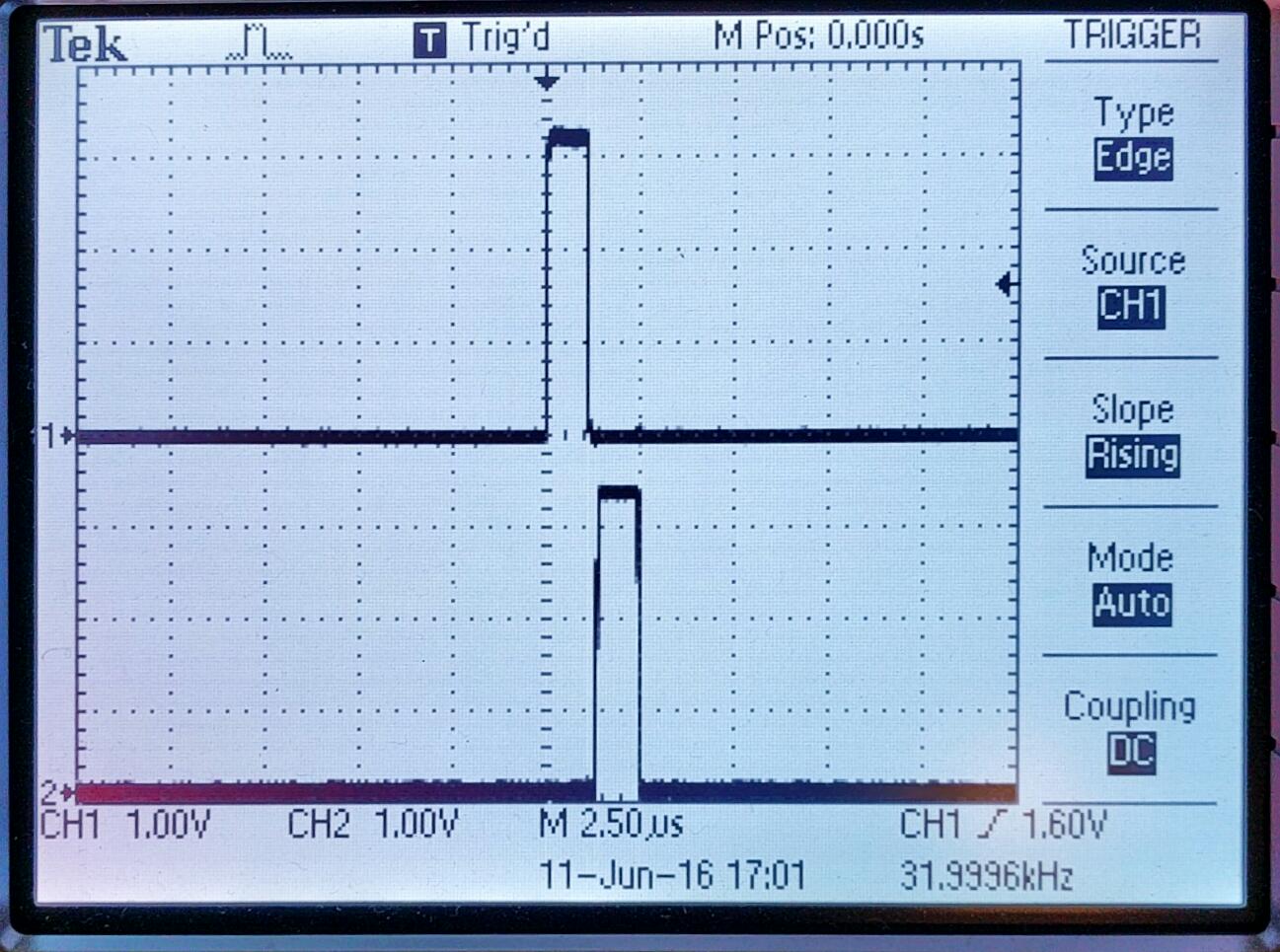Sample application to explain how to use the debug call back of the Unzen Framework
Dependencies: mbed shimabara unzen_lpcxpresso_4337
雲仙フレームワークにはデバッグ用のコールバックを登録することができます。
これらのコールバックはそれぞれ割り込み処理の前、割り込み処理の後、信号処理の前、信号処理の後に毎回読み出されるため、リアルタイムに進む時間計測をオシロスコープなどで観測することができます。
このアプリケーションは、それらのコールバックの宣言方法、使用方法を説明しています。
コールバックの宣言
デバッグ用コールバックは全てvoidを受け取り、voidを返すプロトタイプを持っています。これらはユーザー関数ですので名前は任意です。
コールバックの宣言
void pre_int_callback(void); void post_int_callback(void); void pre_process_callback(void); void post_process_callback(void);
コールバックの定義
デバッグ用コールバックは、割り込みコンテキストで呼び出されます。ですので、割り込みコンテキストでやってもいい処理ならば、何をしてもかまいません。
今回の例ではデバッグ用の信号ピンをトグルしています。すなわち、割り込みの入り口で1にし、出口で0に戻しています。
コールバックの定義
void pre_int_callback(void)
{
debug_flag_1 = 1;
}
void post_int_callback(void)
{
debug_flag_1 = 0;
}
void pre_process_callback(void)
{
debug_flag_2= 1;
}
void post_process_callback(void)
{
debug_flag_2 = 0;
}
コールバックの登録
デバッグ用コールバックの登録メソッドがフレームワークに用意されています。これらの登録は、start()メソッドの呼び出しよりも前にしなければなりません。
コールバックの登録
// debug call back registration
audio.set_pre_interrupt_callback( pre_int_callback );
audio.set_post_interrupt_callback( post_int_callback );
audio.set_pre_process_callback( pre_process_callback );
audio.set_post_process_callback( post_process_callback );
set_pre_interrupt_callback() および set_post_interrupt_callback() で登録されたデバッグ用コールバックは、I2S割り込みの前後でそれぞれ呼び出されます。そのため、デバッグピンをトグルすれば、割り込み処理ルーチンの実行時間を知ることができます。
set_pre_process_callback() および set_post_process_callback() で登録されたデバッグ用コールバックは、信号処理コールバックの前後でそれぞれ呼び出されます。そのため、デバッグピンをトグルすれば、信号処理ルーチンの実行時間を知ることができます。
波形観測
このサンプルを実行した結果をオシロスコープで測定しました。割り込みハンドラの処理終了に続いて、信号処理コールバックが実行されていることがわかります。

main.cpp
- Committer:
- shorie
- Date:
- 2016-06-11
- Revision:
- 0:25d899a39c2c
File content as of revision 0:25d899a39c2c:
#include "unzen.h" // audio framework include file
#include "umb_adau1361a.h" // audio codec contoler include file
#include "mbed.h"
#define CODEC_I2C_ADDR 0x38
DigitalOut myled1(LED1);
DigitalOut debug_flag_1(D6);
DigitalOut debug_flag_2(D7);
// customer signal processing initialization call back.
void init_callback(
unsigned int block_size // block size [sample]
)
{
// place initialization code here
}
// customer signal processing call back.
void process_callback(
float rx_left_buffer[], // array of the left input samples
float rx_right_buffer[], // array of the right input samples
float tx_left_buffer[], // place to write the left output samples
float tx_right_buffer[], // place to write the left output samples
unsigned int block_size // block size [sample]
)
{
// Sample processing
for ( int i=0; i<block_size; i++) // for all sample
{
tx_left_buffer[i] = rx_left_buffer[i]; // copy from input to output
tx_right_buffer[i] = rx_right_buffer[i];
}
}
void pre_int_callback(void);
void post_int_callback(void);
void pre_process_callback(void);
void post_process_callback(void);
int main()
{
// I2C is essential to talk with ADAU1361
I2C i2c(SDA, SCL);
// create an audio codec contoler
shimabara::UMB_ADAU1361A codec(shimabara::Fs_32, i2c, CODEC_I2C_ADDR ); // Default Fs is 48kHz
// shimabara::UMB_ADAU1361A codec(shimabara::Fs_441, i2c, CODEC_I2C_ADDR );
// shimabara::UMB_ADAU1361A codec(shimabara::Fs_48, i2c, CODEC_I2C_ADDR );
// shimabara::UMB_ADAU1361A codec(shimabara::Fs_96, i2c, CODEC_I2C_ADDR );
// create an audio framework by singlton pattern
unzen::Framework audio;
// Set I3C clock to 100kHz
i2c.frequency( 100000 );
// Configure the optional block size of signal processing. By default, it is 1[Sample]
// audio.set_block_size(16);
// debug call back registration
audio.set_pre_interrupt_callback( pre_int_callback );
audio.set_post_interrupt_callback( post_int_callback );
audio.set_pre_process_callback( pre_process_callback );
audio.set_post_process_callback( post_process_callback );
// Start the ADAU1361. Audio codec starts to generate the I2C signals
codec.start();
// Start the audio framework on ARM processor.
audio.start( init_callback, process_callback); // path the initializaiton and process call back to framework
// periodically changing gain for test
while(1)
{
for ( int i=-15; i<4; i++ )
{
codec.set_hp_output_gain( i, i );
codec.set_line_output_gain( i, i );
myled1 = 1;
wait(0.2);
myled1 = 0;
wait(0.2);
}
}
}
void pre_int_callback(void)
{
debug_flag_1 = 1;
}
void post_int_callback(void)
{
debug_flag_1 = 0;
}
void pre_process_callback(void)
{
debug_flag_2= 1;
}
void post_process_callback(void)
{
debug_flag_2 = 0;
}